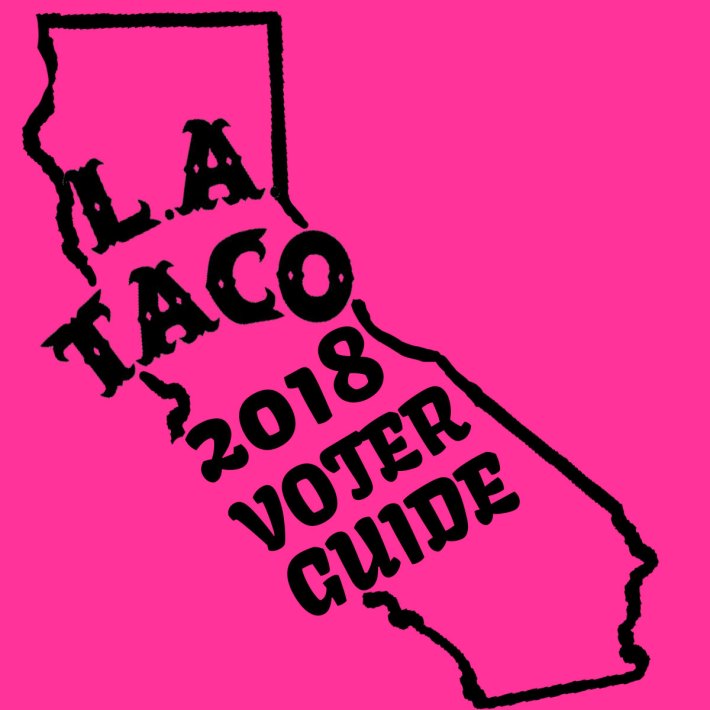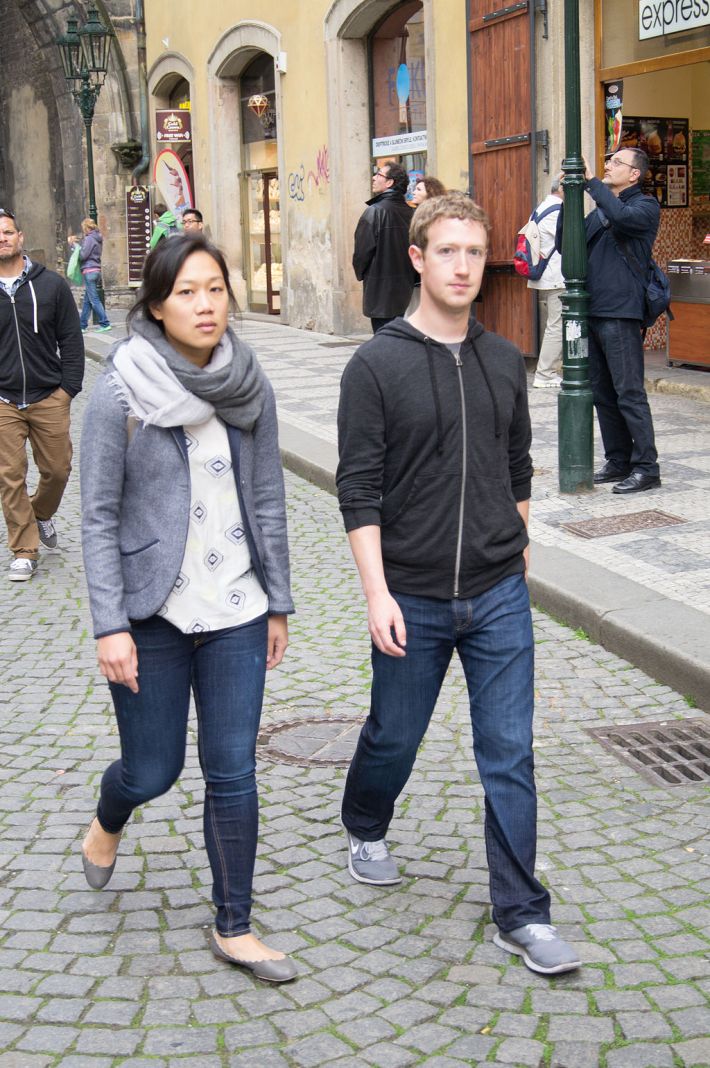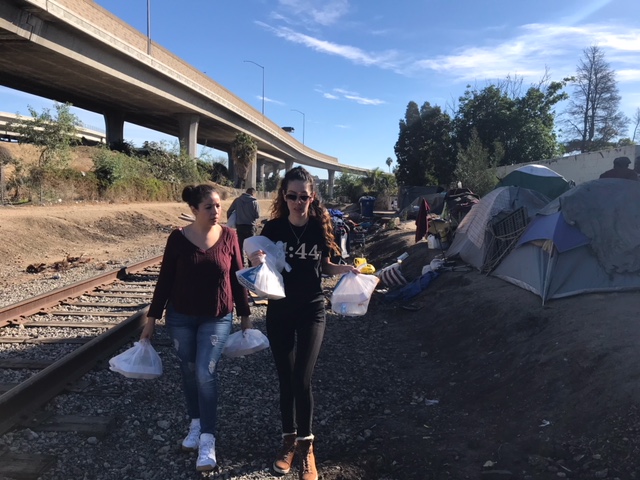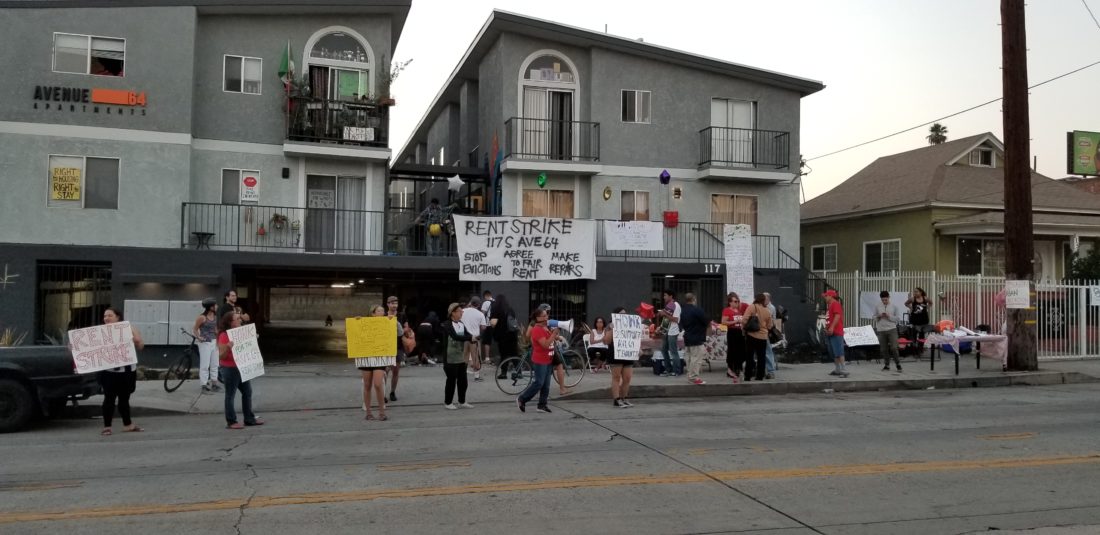Here’s Part 3 of our L.A. Taco Voter Guide, focusing on Proposition 1 and Proposition 2, both of which address housing assistance initiatives with wide-spread support and little opposition. ... They also both come at a steep cost.
Prop 1: “Authorizes Bonds to Fund Specified Housing Assistance Programs.”
[dropcap size=big]U[/dropcap]nlike a lot of propositions in this year’s election, Prop 1 was authored by a state legislator, Jim Beall, the state senator representing most of Silicon Valley. California’s constitution requires that legislatures wanting to sell more than $300,000 in bonds for state projects have to put the proposal up for voters to vote on.
Just for a refresher from civics class, bonds are basically I.O.U.s that the state sells to investors which the state promises to pay back, with interest over time. Currently the state has $83 billion in bond debt, of which, the state is making $6 billion annually in return payments to investors. Prop 1 would add $4 billion to our overall bond debt. That’s a good amount of debt for sure, but Prop 1 wants something very tempting in return — funding for loans for the building of more affordable housing.

Along with giving $1.5 billion to the Multifamily Housing Program, a state program that gives out loans for low income housing, the proposition also funds loans for veterans, farmworkers, and money to the Self-Help Housing Fund that provides forgivable loans and forgivable mortgages for homebuilders.
Maybe our state legislatures were thinking ahead and saw the trend of 90 percent of bond measures being approved by voters because last year the state senate approved two measures, Senate Bill 2 and Senate Bill 35 that were meant to essentially increase the potential of Prop 1 to actually get more affordable housing built. Bills 2 and 35 enacted a fee on real estate transactions. The revenue will then be spent on affordable housing projects and rental assistance programs, along with a requirement that cities build a minimum amount of housing per year.
A report from the California Housing Partnership Corporation from this year says that L.A. County alone needs 568,00 new affordable housing units a year to accommodate low income and very low income residents, just for this year. In 2016 L.A. voters approved measure HHH which sold bonds to build more affordable housing specifically for homeless folks, but the measure was designed to build only 1,000 units a year spread out over 10 years. Across the state, studies have stated that we need to build an estimated 3.5 million new housing units by 2025, but we’re barely building 90,000 a year right now.
Folks have proposed a number of different ways the state can incentivize developers to build more housing. Sidestepping NIMBYism (Not In My Back Yard; folks who are against any kind of increase in housing, especially rich folks who don’t want poor people living in apartments next to them) by changing zoning laws to encourage more affordable housing is an important idea to think about. L.A. has experimented with a program that gives tax incentives to developers to build affordable housing, but the City Controller’s Office found that from 2008 to 2014 only 329 units of affordable housing were built using those incentives.
Somethings can’t be solved simply by relying on the good graces of the private sector, sometimes we need the state to step in and take a lead, especially when it comes to doing things that private sector can’t, or shouldn’t, make money on, including building affordable housing.

[dropcap size=big]T[/dropcap]here’s surprisingly no organized opposition to Prop 1, but if you look in your voter guide there’s one person who is listed as an opponent of the Prop, Gary Wesley.
“I just write ballot oppositions that nobody else would submit against,” Wesley told L.A. Taco from his office in Mountain View.
Weasley, who practices civil law, has been writing opposition statements for statewide bond measures since 1980. He says he just wants people realize the size of our state’s bond debt, and for people to ask themselves “Who’s going to pay for this? The answer, everyone. If we really want housing how are we going to get it?”
The biggest financial backers of this proposition is the Chan Zuckerberg Initiative, run by Facebook CEO Mark Zuckerberg and pediatrician Priscilla Chan, who are married. Luke Stangel, a journalist with the Silicon Valley Business Journal was quick to point out that supporting this bill might be a kind of plea for redemption for Zuckerberg’s Facebook headquarters in Menlo Park, which jacked up the cost of housing in the area. The Yes on Prop 1 coalition also includes the State Building and Construction Trades Council of California, and a number of real estate companies.
There’s no question we need more affordable housing in California, and Prop 1 wants to inch the state closer to building more. But is throwing bond money at the problem the best way to solve it? Or do we need to enact different policies, either more market based incentives, or public housing initiatives to build more affordable housing? Maybe take a break to think about it before we go on to Prop 2, because this one is just as complicated, as just as bond-age-y.

Prop 2: “Authorizes Bonds to Fund Existing Housing Programs for Individuals With Mental Illness.”
[dropcap size=big]Y[/dropcap]et another exciting bond measure put on the ballot by the state Legislature, Prop 2 wants to issue $2 billion in bonds to fund No Place Like Home, a state program that builds housing for homeless folks with mental illnesses. Just to spice up the Prop a little bit, the state wants to repay a part of the $2 billion bond by taking out up to $140 million a year out of the state’s Mental Health Services Fund.
The Mental Health Services Fund was itself created by a proposition. Passed in 2004, Prop 63 taxed people making a million bucks a year or more. The funds from that tax were supposed to put money into expanding mental health services, especially for homeless folks. A report released in 2014 showed that the state couldn’t account for where most of the $13 billion raised went from Prop 63 went, and questioned if money had done anything to ease our homelessness and mental health crises. The congressional Annual Homeless Assessment Report estimated that California’s homeless population is around 134,000 people, and our “unsheltered” homeless population is around 92,000 people, an increase of 13.7% from 2016 to 2017.
Gigi Crowder, a development consultant for the National Alliance on Mental Illness, a No on Prop 2 member, isn’t opposed to housing mentally ill homeless folks, but she would rather see the money from Prop 63 actually feed into mental health services and treatment before it’s feed into housing.
“I’m still waiting for the benefits of the Mental Health Services Fund as a member of the African American community,” Crowder says. “I’d like to see more research dollars for mental health resources and treatment. It [the proposition] takes from a vulnerable group and gives to the biggest winners, which will be developers.”
Like a lot of propositions past and present, Prop 2 sounds like a concept everybody can agree on, that some of the most needy people in society should be helped out, but the actual consequences of the proposition can completely miss those people, and maybe even end up hurting them more by not actually helping them, or diverting funds away from much needed mental health treatment programs.
But, with good government oversight, and a recommitment to actually funding the mental health treatment programs promised by the Mental Health Services Act, maybe this Proposition could actually help folks who need it. The truth is, we, and nobody else, knows for sure. Think about this one for awhile.
LA TACO VOTER GUIDE 2018:
Part 1~ Proposition 10 Clears Hurdle For Rent Control
Part 2 ~ Gas Tax Measure Proposition 6 Is All About Hopes of a Republican Revolt







